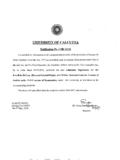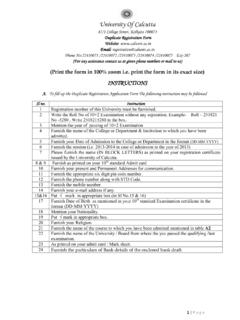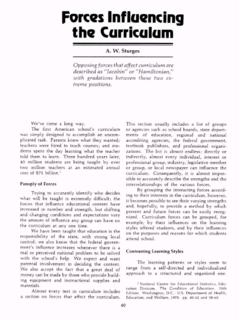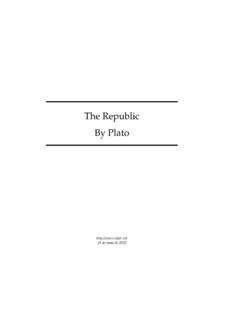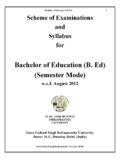Transcription of Syllabus of Three Year Degree Course in …
1 Syllabus of Three year Degree Course in education ( hons ). education -HONOURS. Part-I. Paper-I. PHILOSOPHICAL FOUNDATION OF education AND CONTRIBUTION OF GREAT. EDUCATORS. Course OBJECTIVES: 1. To understand the meaning, aims, functions and role of education . 2. To understand the relation between education and philosophy. 3. To be acquainted with Indian and western schools of philosophy and their impact on education . 4. To be acquainted with the contribution of great educators. GROUP A Philosophical foundation of education MODULE I Approximate lecture Hours 1. Concept and aims of modern education with special reference to Delor' s commission (UNESCO, 1997) (4) 2. Child centric and Life centric education . (4) 3. Functions and scope of education Individual and social perspective. (9) education for Human Resource development.
2 4. education as propagation of values. (3) MODULE II 5. Role of Philosophy in education . (2) 6. Schools of philosophy and their influence on education : Idealism, Naturalism, and Pragmatism. (9) 7. Schools of Indian Philosophy ** Basic features and Influence on education (9) a) Vedic schools (Sankhya, yoga, Nyaya) b) Non Vedic schools (Charvak, Buddhist, Jain) Total Lect. 40 *No broad question from this portion. GROUP-B. 1. CONTRIBUTION OF GREAT EDUCATORS: MODULE-I. Approximate Lecture Hours 1. Rousseau. (6) 2. Froebel (5) 3. Montessori (5) 4. Bertard Russell. (4) MODULE-II. 5. Dewey. (7) 6. Rabindranath Tagore (7) 7. Vivekananda (6) Total Lect. 40 References: 1. -Theory and Principles of education Philosophical and Sociological Bases of education . 2. Banerjee, A -Philosophy and principles of education .
3 3. Chakraborty, -Modern education . 4. Kundu and Majumder -Theories of education . 5. Mukherjee, -Some great educators of the world. 6. Mukherjee, -Principles of education . 7. Munro. -History of education . 8. Purkait, -Great Educators. Bengali Books: 1) Sushil Ray -Shiksha Tatta. 2) Arun Ghosh -Shiksha tatta & Shiksha Darshan 3) Bibhuranjan Guha -Shikshaya Pathikrita. 4) Gouridas Halder & Prasanta Sharma -Shiksha Tatta & Shiksha Niti. PAPER-II. PSYCHOLOGICAL FOUNDATION OF education . 2. Course OBJECTIVES: 1. To understand the meaning of Psychology, and be acquainted with its different perspectives. 2. To realize the relationship between Psychology and education . 3. To know the patterns of different aspects of human developments and relate this knowledge with education . 4. To be acquainted with the cognitive approach to development and thus to understand the processes and factors of cognition.
4 GROUP A DEVELOPMENTAL ASPECTS OF PSYCHOLOGY. MODULE-I. Approximate Lecture Hours 1. Introduction to Psychology, relation between education and Psychology. Different perspectives of psychology (Biological, Cognitive, Developmental, Associationist A brief overview). (12) 2. Personality development. Psychoanalytical theory of Personality, Erikson's Stages of Psycho social development. (8) MODULE II 3. Stages and types of Development and their Educational significance: a) Physical and motor development, Factors affecting Physical and motor development. b) Cognitive development, brief outline of Piaget's theory of Cognitive development. c) Emotional development, Common patterns, Emotional balance and Emotional Quotient. d) Moral development, Theories of Piaget and Kohlberg. (20) Total 40 GROUP-B.
5 Cognitive approach MODULE I. Approximate Lecture Hours 3. 1) Neural basis of cognition: Neuron structure and electrical Potentials, synoptic transmission, structure and functions of human brain, Neuro endocrinal system. (6) 2) Perception: Factors influencing perception, role in cognition. (3) 3) Attention: Selective and divided attention. Role of attention in the Cognitive process. Factors of attention. (4) 4) Memory: acquisition, storage and retrieval of information. Sensory memory, short term and long term memory, forgetting. (7) MODULE II 5) Motivation: types and factors. (2) 6) Learning: Laws of learning, classical and operant conditioning. Insight learning, concept learning, Bandura's social learning theory. Transfer of learning: Concept and application. (10) 7) Intelligence : Theories of intelligence Spearman, Thurston, Guilford and Gardener.
6 (8) Total Lect. 40 References: 1) Spear, , Penrod, , and Baker, (1988), Psychology: Perspectives on Behaviour, New York: John Wiley. 2) Berk, (2003). Child development, Delhi: Pearson education . 3) Baron, (2001). Psychology, Delhi: Prentice Hale. 4) Bichler, , and Snowman, J. (1993). Psychology applied to teaching. Boston: Houghton Mifflin. 5) Normann Sprinthall and Richard, C. Sprinthall, Educational psychology: McGraw Hill Publishing Company. 6) Chauhan. , Advanced Educational psychology: Vikash Publishing House Pvt. Ltd. 7) Diane. E., Papalia and Sally wendkos olds. Human Development: McGraw Hill. 8) Elizabeth, B., Hurlock, Child Development: McGraw Hill Book Company. 9) Kundu, and Tutoo, , Educational Psychology: Sterling Publication. 10) Aggarawal. , Essentials of Educational Psychology: Vikash Publishing house Pvt.
7 Ltd. 11) Richard. A. King, John R. Weisz, John R. Schopler, Introduction of Psychology. 12) Glietman, Alan, J., Fridland, Daniel Reisberg, Basic Psychology. Bengali Books: 1) Sushil Ray Shiksha Manovidya. 2) Arun Ghosh Shiksha Shrai Monobigyan. 3) Pramodbandhu Sengupta & Prasanta Sharma Shiksha Manobigyan. EDCATION HONOURS 4. Part II PAPER III DEVELOPMENT OF education IN INDIA COURE OBJECTIVES: 1. To be acquainted with the salient features of education in India in Ancient & Medieval times. 2. To be acquainted with the development of education in British India. 3. To be acquainted with the development of education in Independent India, including significant points of selected education . 4. To be acquainted with current issues and trends in education . GROUP A education in Ancient, Medieval and British India.
8 MODULE I Approximate Lect. Hours. 1. Synoptic study of Brahmanic, Buddhist and Islamic education in Ancient and Medieval India with respect to a) Aims and Objectives (2) b) Subject of study (2) c) Methods of teaching including teacher Pupil relationship. (2) d) Evaluation (1) e) Centre of Learning. (2) f) education of woman (1) 2. Brief outline of events relating education from 1757 to 1947 Missionaries activities (Srirampur Trio) (3) Charter Act of 1813 (1) Bengal Renaissance Contribution of Rammohan Ray Derozio. And Vidyasagar. (6) Adams Report. (2) Anglicist Orientalist controversy Macaulay's Minute & Bentinck's resolution. (4) Wood dispatch (Recommendations only) (2) MODULE II Brief outline of Hunter Commission 1882 83 (Primary and Secondary education ) (3) Curzon Policy (Quantitative development of Primary education , Quantitative and Qualitative development of Secondary education , 5.
9 Qualitative development of Higher education ). (4) National education Movement (cause and effect) (2) Calcutta University Commission (1917 1919) (2) Basic education (concept & development) (2) Sargent Plan (1) Total Lect. 42 GROUP B. Development of education after 1947. MODULE-I. 1. Constitutional provision for education in India (4) 2. Brief outline of the recommendations made by different education Commission: University education Commission (1948 49) (4) (Aims of Higher education & Rural University) Secondary education Commission (1952 53) (5) (Aims, Structure & Curriculum of Secondary education ) Indian education Commission (1964 66) (7) MODULE-II. 3. National Policy on education (1986). (7) 4. Current issues in education : Equalization of education Opportunities. (5) Programmes on Universal Elementary education (DPEP &SSA) (4) Non formal education and alternative schooling, education of women (5) Total Lect.
10 41 References: 1. Atlekar, education in Ancient India. 2. Basu, education in modern India. 3. Basu, Adam's Report. 4. education in India past, Present and future. 5. Dhar, Niranjan. Fundamentals of Social education . 5. Keay, India education in Ancient times. 6. Law, Promotion of Learning in India. 7. Mukherjee, education in India, Today & Tomorrow. 8. Mukherjee, History of education (Modern Period). 9. Nurulla, S., Naik, History of education in India. 10. Purkait, History of Indian education . 6. 11. Rawat, History of Indian education . 12. Sreemali, The Wardha Scheme. 13. Indian education act. 1904 14. Govt. of India report of University education Commission (1948 49). 15. Govt. of India report of Secondary education Commission (1952 530. 16. Report of education Commission (1966) education and National development, Ministry of education , New Delhi.)





